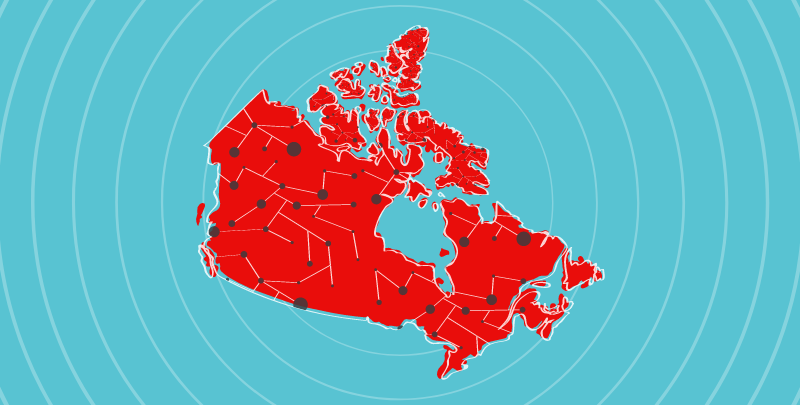[Ottawa, ON]
CANARIE, a vital component of Canada’s digital infrastructure supporting research, education and innovation, today announced the completion of a number of projects that increase the capacity and reliability of the National Research and Education Network (NREN). These projects were funded jointly by CANARIE and its provincial and territorial partners in the NREN.
Through these projects, research centres, college and university campuses – and the students and researchers they serve – will benefit from new or enhanced connections to the NREN. These connections enable ultra-high-speed access to colleagues, research instruments, services, and data across Canada and around the world. Canada’s NREN connects over 750 post-secondary institutions, hospitals, research facilities, government departments, and innovation centres to thousands of similar institutions worldwide through a global web of over 100 NRENs.
“Canada’s NREN partners work together to continually extend, evolve, and deliver essential digital infrastructure to support world-class research, education, and innovation for Canadians,” says Richard Lacombe, President and CEO of RISQ and Chair of the NREN Governance Committee. “Our coast-to-coast-to-coast partnership is improving efficiencies, while strengthening Canadian leadership in science and technology.”
“The collaborative efforts of Canada’s NREN partners support research and innovation across all sectors in Canada,” says Kathryn Anthonisen, President and CEO of CANARIE. “Our shared vision is to continue to evolve essential digital infrastructure to position Canada at the forefront of research and innovation. We’re proud to help bring these projects to life – they are truly a testament to the collaborative ethos of the NREN community.”
- In Alberta, Cybera undertook two projects to upgrade core network equipment in Calgary and Edmonton to expand capacity to meet current and anticipated network demand. These network upgrades will allow members to connect to the NREN at speeds of up to 400 Gbps (Gigabits per second), enabling Cybera to reliably serve its busy research and education hubs for years to come.
- In British Columbia, BCNET enhanced its network infrastructure by constructing an alternate 100 Gbps network path for the Kamloops Data Centre to operate across existing network infrastructure. This network segment spans approximately 430 kilometres between the central interior of BC and Vancouver’s lower mainland and replaces the current alternate connection which is no longer sufficient to support capacity needs. The addition of this alternate network complements the existing 100 Gbps network service in place between Kamloops and Vancouver and adds much-needed network resiliency for the post-secondary institutions, teaching hospitals, and research institutes in the province that rely on it.
- In Prince Edward Island, ECN-PEI upgraded the network equipment and infrastructure connecting the University of PEI’s (UPEI) main campus in Charlottetown to its School of Climate Change and Adaptation in St. Peter’s Bay to provide a reliable connection that can support UPEI’s current and anticipated needs. Additionally, ECN-PEI enhanced the network that runs between ECN-PEI and the rest of the NREN by adding a new connection in Moncton. This additional connection point serves to further strengthen and improve the overall dependability of the network.
- In Ontario, ORION undertook two projects to upgrade its core network capabilities across the province. The first project involved the upgrade of three network segments – totalling over 1,040 km of connected fibre – to improve capacity and ensure the network will continue to meet the needs of ORION’s research and education community. The second project saw the upgrade of a 550 km-long network segment spanning from Toronto to Sudbury, increasing its capacity to 400 Gbps.
For more information, please contact:
Lesley McElroy
Director, Communications
CANARIE
lesley.mcelroy@canarie.ca


